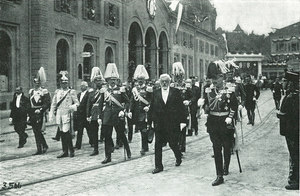
Unternavigation
Ludwig Forrer
Ludwig Forrer (1845-1921) became one of the main exponents of health and accident insurance – first as a liberal national councillor at the turn of the century, and later as a federal councillor.
Forrer grew up in modest circumstances. He studied law at the University of Zurich and served temporarily as a police officer and public prosecutor. He opened a law firm in Winterthur in 1873. While working as a lawyer, he successfully defended the liberal revolutionaries active in canton Ticino in 1891. Forrer joined the Democratic movement in 1867, which campaigned on the left wing of the liberal family. He was elected a cantonal councillor for Zurich three years later. From 1881 to 1900, he served as a member of the radical democratic majority in the National Council and was involved in founding the Free Democratic Party (FDP) in Switzerland in 1894. As a follower of the ‘Winterthur school of thought’, Forrer was committed to the expansion of democratic rights and advocated public intervention for solving ‘social issues’. In 1887, he also pushed for the standardisation of civil and criminal law. After the first proposal for health and accident insurance failed, Forrer resigned as national councillor in 1900 and took on the management of the International Office for Railway Transport. Forrer was elected to the Federal Council in 1902, where he served until 1917. He headed the Post and Railway Department for a substantial length of time. In 1917, he stepped down as federal councillor and resumed management of the International Office. From this point on, he only rarely expressed his political views publicly. Such instances included the Vorarlberg issue, while in 1919 he joined the expert commission for old age and disability insurance.
Forrer’s dedication to social policy focused on the introduction of accident insurance. He was a committed exponent of the insurance principle, according to which major risks threatening individual livelihood should be covered by a broader risk-sharing community. As a lawyer, he often represented injured workers in court. He did so at a time when the Factory Act of 1877 still prescribed employers' liability in the event of occupational accidents. Forrer believed accident insurance to be a superior system to liability, since liability regulation often compelled injured workers to assert their claims to compensation in court. Conversely, accident insurance would provide a legal entitlement to automatic compensation in such cases. The socialisation of risks reduced the risk to business owners that they would have to pay out for occupational accidents themselves. Forrer sought nothing less than a pacification of labour relations: ‘Liability means dispute, insurance means peace.’ In 1890, the Federal Council entrusted Forrer to write a memorandum initiating the introduction of a state accident insurance. In this report, Forrer picked up on Bismarck’s social insurance laws and proposed the introduction of compulsory accident insurance for all workers in industry. To avoid problems of having to separate accident from sickness, health insurance was to also be declared mandatory. Forrer then presided the commissions appointed by the National Council and Council of States to prepare a constitutional basis for health and accident insurance.
The constitutional article was accepted by a clear majority of voters on 26th October 1890. The authorities thus began preparing the corresponding bill. As a distinguished expert on the matter, Forrer drew up a draft for the Health and Accident Insurance Act (KUVG) in 1893 on behalf of the Federal Council; the draft was then debated by an expert commission and in Parliament. It contained 400 articles, thereby making the KUVG the most extensive legislative proposal in the history of the country at that time. The issue of how health insurance and its financing were to be organised remained subject to intense debate. Although Forrer advocated a centralist solution, he had to make compromises particularly with respect to organisational aspects. The ‘Lex Forrer’ – the name soon given to the bill – still enjoyed the backing of the most important parties and economic and social associations in Parliament. However, the proposal suffered a major defeat after a referendum campaign in 1900. The opposition comprised a heterogeneous coalition of exponents of Western Switzerland’s sickness funds association, private accident insurers, business circles as well as farmers and workers. Compulsory health insurance most notably raised anti-statist concerns.
After his election to the Federal Council in 1902, Forrer swiftly initiated work on a more streamlined version of the bill. Although he no longer took on a leading role, he was a member of the Federal Council’s delegation preparing the second proposal. The Health and Accident Insurance Act of 1911 finally stipulated a compulsory and centrally managed accident insurance. The proposal did not, however, include mandatory health insurance for workers; the new act merely recommended a framework that granted subsidies to private health funds and authorised cantons to introduce compulsory health insurance. After an intense referendum campaign, with Forrer personally involved, voters accepted the proposal by a narrow margin on 4th February 1912.
Literatur / Bibliographie / Bibliografia / References: Labhart Walter (1972), Bundesrat Ludwig Forrer 1845-1921, Winterthur; Altermatt Urs (1991), Die Schweizer Bundesräte. Ein biographisches Lexikon, Zürich.
(12/2014)




